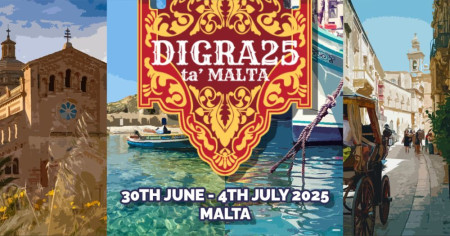DIGRA 2025

Date: 30.06.2025 - 04.07.2025
Conference / symposium
Format: hybrid
Location: Valletta, Malta
Event Fee: Free
Organizer(s):
The Institute of Digital Games (University of Malta)
Games at the Crossroads EasyChair submission link: https://easychair.org/conferences/?conf=digra2025 DiGRA 2025 will take place in Valletta, Malta, 30th June – 4th July 2025. A pre-conference will be held one day prior to the official beginning of the conference, on Monday 30th June, with a PhD Consortium and Workshops. The theme of the conference will be Games at the Crossroads, exploring games and game studies at points of (cultural, disciplinary) encounter and divergence. Malta has often been characterised as a country at the crossroads. Situated in the middle of the Mediterranean Sea, its archipelago lies at the intersection of ancient and contemporary routes of trade and migration connecting north and south, east and west. Culturally as well as geographically, it bridges Europe and North Africa, and has been marked by millennia of cultural interchange, encounter, and currents of trade and migration across the Mediterranean. Moreover, the Malta of the present has also been described as standing at the crossroads of past and future: a country with a rich heritage and tradition that is undergoing rapid change into a cosmopolitan metropolis as a hub in globalised networks of migration and capital. This positions Malta as the ideal location for discussing games at the crossroads: between cultures, between academic disciplines, between media, between different social groups and divergent interests, and between where games (and game studies) have been and where they might go next. As the academic discipline of game studies concludes its first quarter-century since the launch of DiGRA and the Game Studies journal, it is a good time to pause and take stock of how far game studies has come, and where the academic field can go next. Of course, as an interdisciplinary field (Mäyrä 2008; Taylor 2024), game studies has always been positioned at the crossroads, marking a point of encounter between the humanities, the social sciences, creative practice and computer science. However, we are at a point when a lexicon of concepts, ideas and approaches has come to be established within the field. This necessitates a step back to ask questions about what game studies has achieved, as well as about the blind spots of established wisdom and existing knowledge in the field. It is not just game studies as an academic discipline, though, that appears to have arrived at a crossroads. Marked by waves of layoffs, studio shutdowns, questionable labour practices, industry consolidation and simultaneous claims regarding the unsustainability of AAA game production and the unviability of independent game production, there is the feeling that games themselves – as an industry and a technocultural practice - stand at a turning point. Where do games and the games industry go from here? There are other senses in which we can think of games at the crossroads. For historical, cultural and economic reasons, games have tended to be produced within contexts of privilege, and to overwhelmingly represent dominant cultures and values while marginalizing alternative identities. It is still the case that many games offer “white imperial pleasures” (Jayanth 2021). How can we think about games as sites and practices of encounters between different cultures? How can we think post- (and de-)colonially about who gets to make, play, and speak about games (Mukherjee 2017)? How do we ensure that the voices leading such conversations are not the same Western-centric ones that have tended to dominate the field, both as practice and scholarship - furthering DiGRA’s work to widen its international reach and diversity, with regional chapters and attempts to bring the annual conference to different geographical locations? How can we consider the extent to which games and game studies are open to identities and individuals marginalized on the basis of gender, orientation, ethnicity, culture, and nationality, and what happens (or can happen) in the encounter between games and such identities and individuals? (In this regard, it is an enlightening example that Ruberg and Phillips write that “the place where queerness meets games is a site of radical potential” (2018).) Can games serve as places for conversation and discussion, and for the coming together and inclusions of different identities, social groups, cultural and political perspectives – or do they still tend to contribute to entrenched hegemonies? Finally, we might also want to think about the role games do – or might – play at a historical juncture that has been labeled the age of the ‘permacrisis,’ marked by catastrophic climate change, war, genocide, rising inequality, and politics of austerity, division and exclusion (Janik and Vella 2022). How are games intertwined with these permacrises? Do they contribute to the factors fuelling the crises (e.g. Abraham 2022), or can they meaningfully address them? What role do games have – or can have – at a time when ‘we’ (however we define or draw the boundaries of this ‘we’) feel ourselves to stand at a crossroads? We want to encourage scholarly reflection on all the diverse ways games and play stand at the crossroads. Suggested themes include but are not limited to: - The past, present and future of game studies - The games industry at the crossroads - Games (and game studies) in a time of crisis - Games as points of encounter - Post- / decolonial perspectives on games - Games, game studies, and identity - Games and interdisciplinarity - Games, inclusion, exclusion - Regional and indigenous perspectives on games and game studies - Technology and platforms at the crossroads - Materiality, digital, analogue, and hybrid games - Games and meaning in a time of crises - Players at the crossroads - Neoliberalism and games - Gamification of work - Games and human rights
https://digraconference2025.org/
Call for Papers
DiGRA showcase platform for early career and precarious academics
Deadline: 19.01.2025
Post created by: Lymor Wolf Goldstein